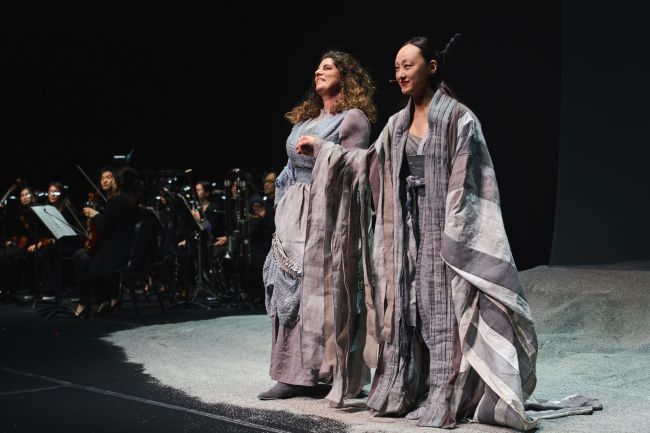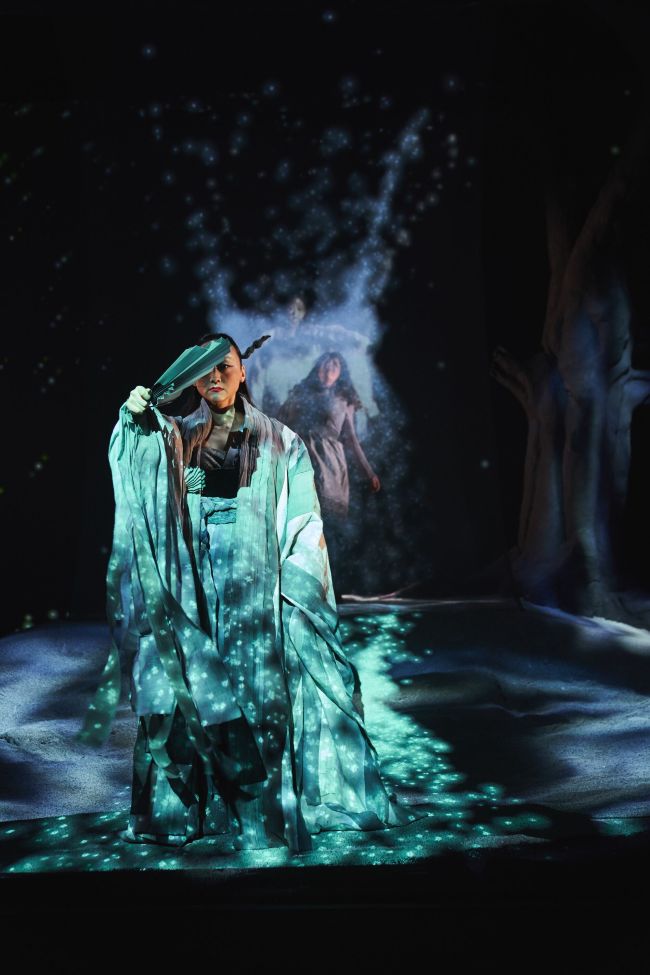[Herald Review] ‘Where do I come from? Where am I going?’
By Im Eun-byelPublished : March 31, 2019 - 17:01
TONGYEONG, South Gyeongsang Province -- Refugees were on composer Toshio Hosokawa’s mind when he wrote “The Maiden From the Sea” in 2017. At the time, images of refugees’ suffering and deaths had shocked and distressed the world.
“The Maiden From the Sea” had its Asian premiere at the Tongyeong International Music Festival on Friday and Saturday.
“The Maiden From the Sea” had its Asian premiere at the Tongyeong International Music Festival on Friday and Saturday.

The Black Box theater of the Tongyeong Music Hall, a space dedicated to innovative, experimental performances, was an apt venue for the piece by Hosokawa, who studied under the late composer Yun I-sang in Germany and refers to Yun as his father. He attributes the roots of his music to the Korea-born composer.
The Tongyeong performance started off with a part of the Japanese composer’s “Voyage” series. Hosokawa began working on the 10-part cycle in 1997, with each work featuring a different solo instrument, backed by chamber music.
For Tongyeong, “Voyage V” was chosen, showcasing a flute performance by Kim Yu-been. Using seven varieties of the flute, Kim put up a breathtaking performance, showing the audience all the sounds that the woodwind instrument can create.
For the main opera piece that followed, Hosokawa combined Noh with Western opera in tackling the subject of refugees.

The libretto is based on the Noh play “The Two Shizukas.” A character named Shizuka possesses a refugee, Helen, and tells the story of how she lost her love and her child in a power dispute.
Singing that there should not be wars and disputes, Shizuka criticizes the current refugee crisis. In the end, Helen leaves for the mountains for a new life.
Soprano Sarah Wegener took the role of Helen, while Noh singer-dancer Ryoko Aoki played Shizuka. The two singers, with different voice ranges and intonations, delivered different emotions to the audience.
Though the opera piece incorporates Western harmonies, the Noh singer maintained a single-line melody and showed restrained dance movements, evoking a chilling atmosphere.
The stage setting was simple -- only two pieces of fabric hanging from a tree. But mapped videos and lighting effects were impactful.
However, it may be difficult for the audience to discern the implicit message of the opera. Shizuka’s story is based on a dispute between two Japanese samurai brothers, with the fighting between the siblings hinting at civil wars of today. Shizuka loses her son, while Helen loses her brother as result of the fights.
The play opens with Helen asking herself, “Where do I come from? Where am I going?” and ends with the same questions.
Audience members are compelled to ask the same questions of themselves. They are urged to wonder where wars and disputes come from, and where they are headed, questioning where humanity comes from and where it is going.
By Im Eun-byel (silverstar@heraldcorp.com)



















![[Today’s K-pop] BTS pop-up event to come to Seoul](http://res.heraldm.com/phpwas/restmb_idxmake.php?idx=642&simg=/content/image/2024/04/17/20240417050734_0.jpg&u=)